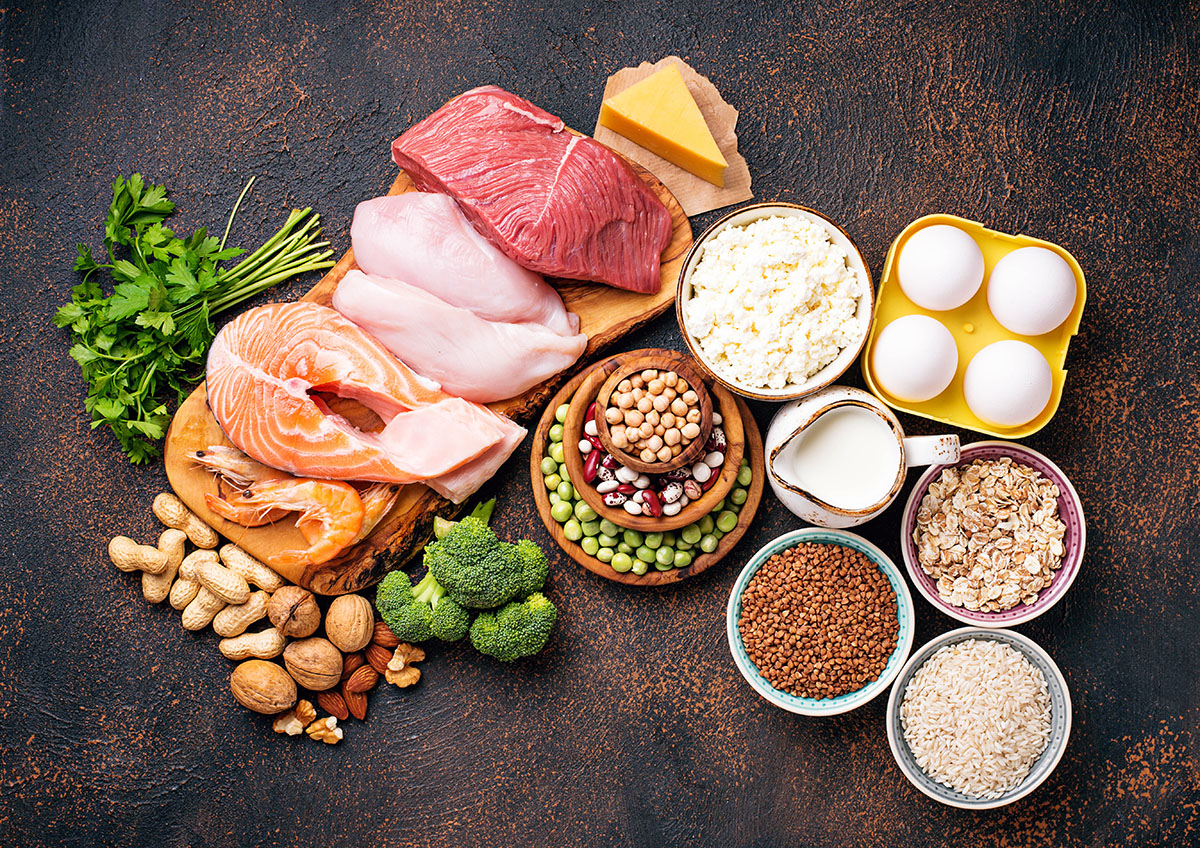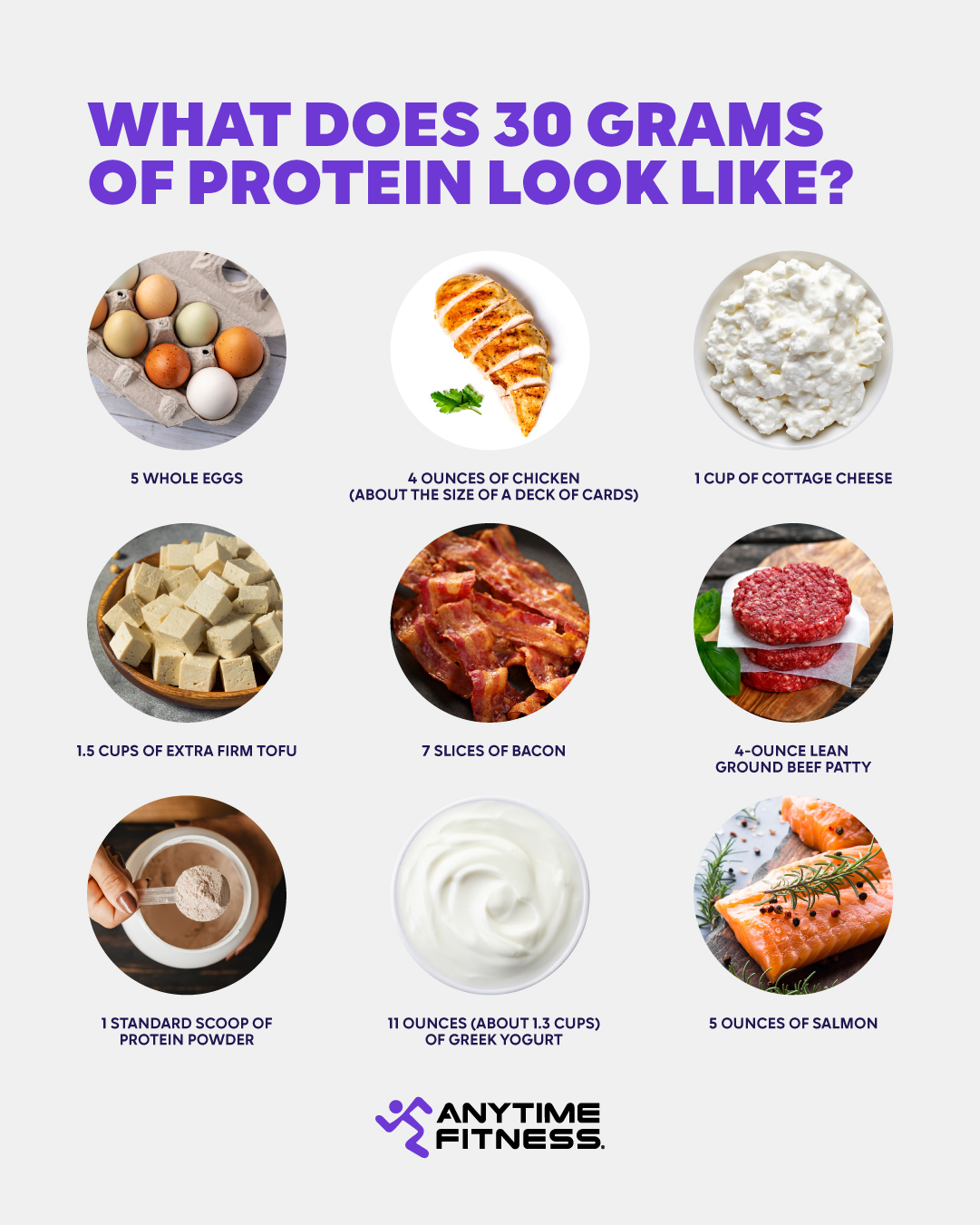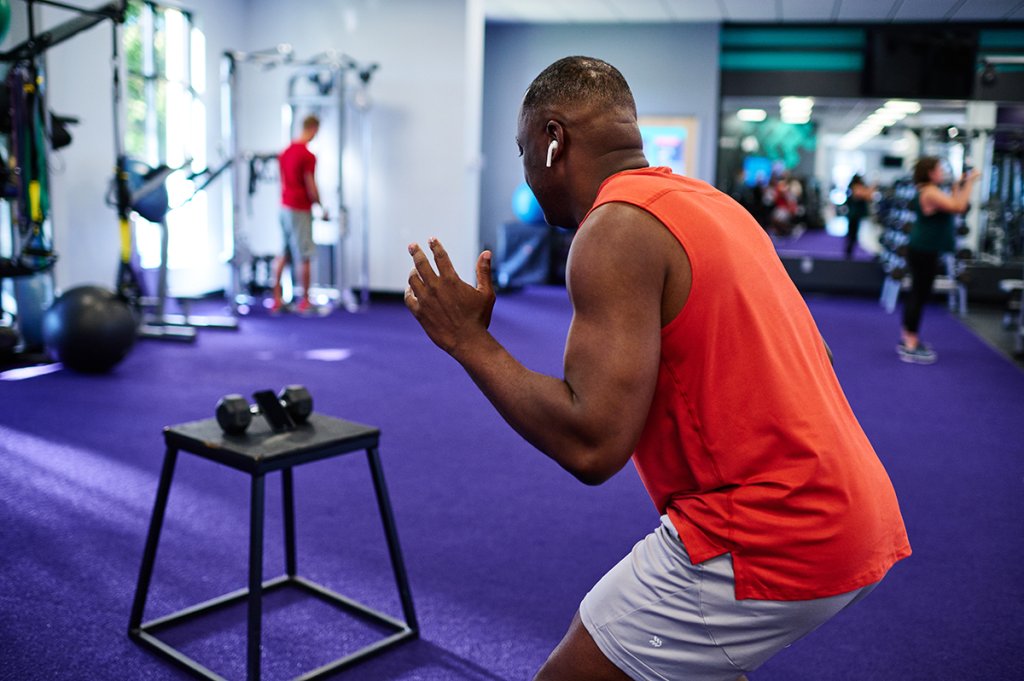If “bigger muscles” is on your fitness checklist, proper nutrition is a top priority. Specifically, getting adequate protein in your diet.
How much protein you need for muscle growth depends on several factors. Here, we’ll cover everything you need to know about using protein to fuel muscle growth, including:
- Benefits of protein
- Daily protein intake for muscle gain
- What are the best sources of protein
- How much protein is in common foods
- Three tips for getting more protein in your diet
- How much protein is too much
What are the benefits of protein?
Protein is one of the three macronutrients (aka macros) your body needs to survive and function properly. It benefits your overall health and fitness in several ways:
- Curbs hunger: Dietary protein is more satiating than other macros, helping you stay full longer.
- Prevents weight gain: By keeping you satisfied for longer, protein can help you avoid cravings and weight gain.
- Helps your body produce hormones: Your body uses protein to make many hormones, including insulin, which is key for blood sugar balance.
- Provides energy: Protein steps up to fulfill your energy needs when carbs and fat are in short supply.
- Optimizes brain health: Your brain is mostly made up of water and protein, making it a key nutrient for brain health.
- Supports the immune system: Proteins are used to create antibodies, which help your immune system fight bacteria, viruses, and other unwanted substances.
- Builds and repairs tissues: Every tissue in your body — from muscle to skin to bone — needs protein for growth and repair.

How protein builds muscle mass
Pairing protein with strength training is a recipe for muscle growth.
Strength training challenges your body and creates tiny tears in muscle tissues. During recovery, your body stitches the muscles together and builds new tissue, a process that requires protein.
Protein is made up of combinations of 20 amino acids. Each amino acid plays a unique role — some are more helpful for muscle growth. These include the three branched-chain amino acids:
- Leucine triggers the process of creating new proteins for the muscles.
- Isoleucine controls energy levels.
- Valine encourages muscle growth and repair.
Daily protein intake for muscle gain
Most people’s daily recommended protein intake is 0.8 grams per kilogram (g/kg) of body weight (0.36 grams per pound). If you weigh 150 pounds, that equals 54 grams of protein per day.
To put it another way, the average person should consume roughly 10% to 35% of their daily calories from protein. That means if they need 2,000 calories daily, 200 to 700 calories should be from protein.
But if you’re strength training to build muscle mass, you’ll need a surplus of protein to ensure you have enough to repair and grow muscle tissue. “Aiming for 1.2 to 1.6 g/kg of body weight will be adequate to support muscle building,” says dietitian Noelle Schleder, MS, RDN, of Stronger U Nutrition.
If you’re using percentages, aim to get roughly 35% of your daily calories from protein.
The optimal protein intake range for muscle mass is the same for men and women, Schleder adds. However, women generally weigh less, so they need less protein overall.
Older adults (65+) can benefit from a bit more protein in their diet to stay ahead of age-related muscle loss (sarcopenia). Schleder suggests aiming for the higher end of muscle-building protein recommendations.
How much protein do you need after a workout?
Exercise — and strength training in particular — breaks down muscle tissue. Getting protein into your system within two hours of finishing your reps helps kick-start muscle repair and growth.
So, how much protein for weight lifting? Aim for 15 to 25 grams to help you meet your protein goal for muscle growth.
What are the best sources of protein?
There are tons of protein-rich foods you can choose for your muscle-building diet. Among the best sources of protein are those that contain all nine essential amino acids your body needs but can’t make on its own. These foods are also called “complete proteins,” and they include:
- Chicken
- Turkey
- Beef
- Pork
- Fish
- Dairy products (milk, cheese, and yogurt)
- Eggs
- Quinoa
- Hempseed
- Buckwheat
- Soy products (tofu and tempeh)
- Whey protein powder

Can you build muscle with plant-based protein?
Animal foods are complete proteins and offer the best bang for your buck. But what if you don’t eat animal products or you’re cutting back on meat? Can you build muscle with plant-based protein?
You sure can! While animal protein tends to better support muscle growth, there are many plant-based proteins you can use to meet your quota for muscle-building.
Complete plant-based protein sources that provide all essential amino acids are your best bet. These include:
- Quinoa
- Hempseed
- Buckwheat
- Soy products (tofu, tempeh, and edamame)
However, you can also get protein from other plant foods, including:
- Beans and legumes (chickpeas, black beans, green peas, and kidney beans)
- Broccoli
- Nuts and seeds
- Oats
- Spinach
- Pea protein powder
Note that plant-based protein sources aren’t as well-absorbed by your body as animal sources, says Schleder. Getting a variety of plant foods in your diet can help you reach your optimal protein intake to build muscle.
How much protein is in common foods?
Once you know how much protein you need for muscle growth, you can more easily meet your needs by knowing the amount of protein in common foods. Here are a few examples.
How much protein is in chicken?
A 3-ounce serving of rotisserie chicken packs in 24 grams of protein. Similarly, a 3-ounce serving of ground turkey contains 23 grams.
How much protein is in ground beef?
A 3-ounce serving of ground beef provides 15 grams of protein.
How much protein is in an egg?
One large, whole egg contains 6 grams of protein.
How much protein is in Greek yogurt?
A 7-ounce serving of Greek yogurt contains 20 grams of protein.
How much protein is in protein powder?
The amount of protein in a powder differs by brand and variety, but a 29-gram scoop of whey protein powder contains around 17 grams of protein, while a 22-gram scoop of pea protein powder contains 19 grams of protein.
What does 30 grams of protein look like?
Aiming for 15 to 30 grams of protein at each meal can help you meet your daily needs for muscle growth. Here’s what 30 grams of protein looks like — use this guide for easy reference.

3 tips for getting more protein in your diet
If you’re serious about building muscle mass, getting more protein in your diet is non-negotiable.
1. Lead with protein
Schleder recommends planning your meals around the protein source. Decide your protein for each meal and add foods that complement it. For example, breakfast protein is an egg scramble with ground turkey. Toss in chopped peppers for more fiber and nutrition and eat with a slice of whole-grain toast.
2. Boost serving sizes
Increase your portions of whole food protein sources, Schleder suggests. For example, if lunch typically includes 3 ounces of chicken, start aiming for 6 ounces.
3. Snack on protein
Feeling peckish? Instead of reaching for chips or a granola bar, snack on high-protein foods like jerky, Greek yogurt, hard-boiled eggs, or a small protein shake.
How much protein is too much?
While protein is an essential building block, it’s possible to eat too much of it. Eating a very high-protein diet may harm your kidneys, increasing your risk for kidney stones.
In addition, many protein foods are also rich in saturated fat and calories. Think: red meat, cheese, and full-fat dairy products. Consuming high amounts of these forms of protein can increase daily calorie intake and may lead to weight gain over time.
Knowing how much protein is too much can be tricky. To play it safe, limit your protein intake to no more than 2 g/kg of body weight daily.
A final word on how much protein you need for muscle growth
Nutrition and protein intake always play a vital role in your fitness journey — especially if your goal is muscle growth. Remember that consistent strength training and diet are key to supporting long-term results, and our expert Coaches can help you determine the right balance of strength training and nutrition to support your goals.
Try this: Recipes to meet your protein goals
Hungry for more nutrition tips? Head to the Anytime Fitness blog for more recipes and guidance from our expert Coaches and dietitians to help you hit your fitness goals.



